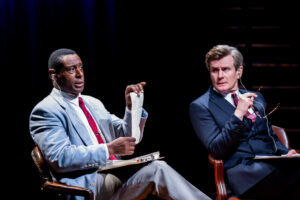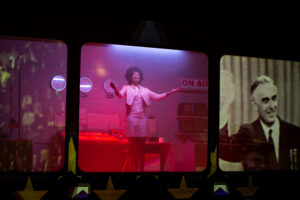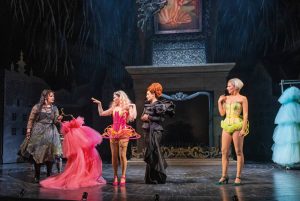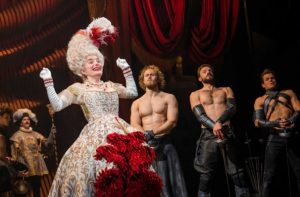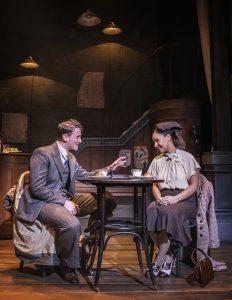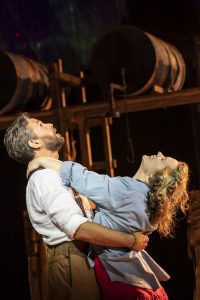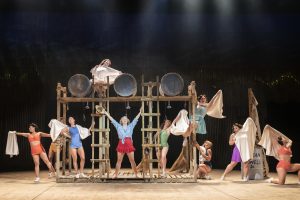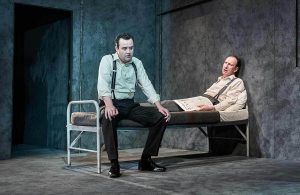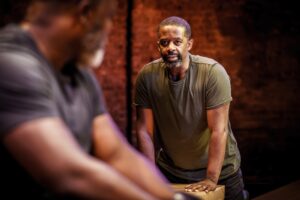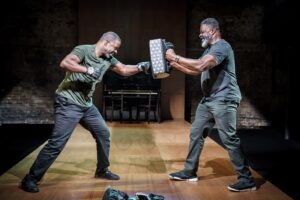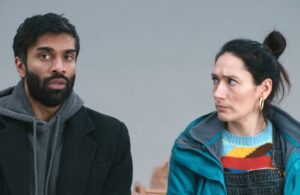McGovern is terrific, shame about the script
★★★
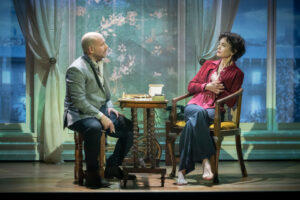
It might have been best if the conversations in AVA The Secret Conversations (Riverside Studios) had stayed secret. Having said that, there is one major strength in this production: Elizabeth McGovern. She may never have been a sex goddess like her character Ava Gardner but she sure can act. Best known today as Lady Cora in Downton Abbey, she has been a regular on screen and stage for her whole adult life, and it shows. She conveys brilliantly a woman in later life struck down by illness, looking back in puzzlement, at what she had and what she still retains.
Elizabeth McGovern is also the writer. On the strength of this play, she might be better to stick to acting. It’s based on a book by Peter Evans in which he wrote about his experience as a ghostwriter working with Ava Gardner on a planned autobiography. That’s both its strength, in that we get insights into her character from the way she interacts with him, and its weakness, in that the interview format prevents a deeper look at what actually happened in her life.
I’m going to assume that a film star (even one of the sexiest in cinema history according to Empire magazine), who hit the heights in the 50s and 60s, isn’t going to be of that much interest to today’s audiences. Maybe lovers of old movies will have a soft spot for The Killers, The Barefoot Contessa or The Night Of The Iguana, but any new play about her has to excite because of the character created here and now on the stage.
The play, directed by Gaby Delial, does establish that Ava is (or was) an interesting woman. She came from a poor country background and stumbled into Hollywood almost by accident. She clearly had something that the camera loved. This quality goes beyond being physically attractive to conveying an image that suggests ‘sex’ to large numbers of people. Whatever it is, she had it, and the studios exploited it. It seems her many lovers were attracted to her image more than her. Her marriages to Mickey Rooney when she was still a virgin, bandleader Artie Shaw and most famously Frank Sinatra were crammed with sex, which she says she greatly enjoyed, but they were short-lived, suggesting that sex could only sustain her relationships for so long. Interestingly divorce or the end of a sexual relationship didn’t stop her from having long-lasting friendships with some of her lovers, Sinatra included.
I didn’t feel much wiser by the end as to what made Ava Gardner a sex symbol, whether her failed relationships were due to bad choices, whether her enjoyment of sex clouded her judgement of character, or why so many people became attached to her as a friend and she to them.
Peter’s publisher, whom we hear on the phone, is particularly, and repeatedly, keen to know the size of Frank Sinatra’s penis. Apparently Ava had alluded to it in a previous interview. We never find out, and that seems true in this play of so many of the questions we might ask about Ava.
Ava Gardner is the only rounded character
The problem I think is in the writing. Anatol Yusef is an excellent actor but I never felt he was at home in the role of Peter Evans, the would-be novelist who doesn’t really want to write a pot boiler biography. And when he enacts scenes as Ava’s various husbands, none came to life. The script didn’t seem to me to create a rounded picture of Peter Evans or the husbands, in the way that it did of Ava. Mickey Rooney is reduced to ‘child like’, Artie Shaw to ‘controlling’, Frank Sinatra to ‘a hot headed drunk’. It seems like Ms McGovern wanted to write a play about Ava Gardner but Peter Evans got in the way. However, since this whole edifice is built on Peter’s interpretation of his conversations with Ava, it might have useful to gain more insights into him. I couldn’t detect any chemistry and therefore I had no reason to believe they would develop a close relationship, which is important to understanding why and how she fell in love with other men in her life.
There is a dramatic climax but the structure of the play doesn’t really lead up to it. The curtain goes up on their first meeting and comes down with their last. In between, their relationship does develop and we do get to know Ava a bit, but mainly we are given a parade of tantalising glimpses into the life and career of a fascinating woman who as she puts it (and I paraphrase here) ‘made movies, made out, and made a mess of her life. But never made jam.’
What we most certainly do get is a poignant picture of a person in her twilight years, full of memories but unable to understand what they add up to. And that is thanks to an impressive performance by Elizabeth McGovern. She starts as something of a wreck, before gradually gaining confidence, until by the end she regains the glamour and power of old.
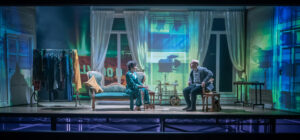
There is one other star of the show and that’s the set. It’s credited to 59 Productions who specialise in integrating projection into live performances, but it’s not so much the way clips of Ava Gardner’s films are layered into the show, it’s the actual use of the proscenium arch by their designer Hannah Rozenberg that caught my eye. It starts with a small aperture on the right revealing Peter Evans answering the phone to Ava in the middle of the night. To the left, a larger oblong opens to show Ava’s flat (and it is a flat in London, not a Los Angeles apartment). That pros arch opening varies in shape to match various cinema screen formats that she worked in. Eventually, as the star and her ghostwriter become closer, the two sections join into one large set. Almost worth seeing for the set alone.
AVA The Secret Conversations is running at Riverside Studios in Hammersmith London until 16 April 2022.
Click here to watch the review of SAVA The Secret Conversations on YouTube
